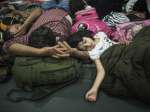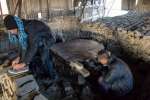Look Who's Coming to Europe, by António Guterres
Analysis/Editorials, 9 May 2011
High Commissioner's Op-Ed published in the International Herald Tribune and New York Times, 9 May 2011
I recall vividly the intoxicating feeling of freedom and promise brought about by the "Carnation Revolution" in my native Portugal in 1974. I was 25 years old. Five decades of dictatorship had led us into economic stultification and costly, indefensible colonial wars. Suddenly there was democracy, or at least a plausible possibility of it, together with the stabilizing and enriching prospect of greater integration into Europe.
The success of Portugal's revolution was not inevitable. There was a significant period of political instability, social unrest and economic dislocation, and there were even efforts to hijack the revolution and take the country down an anti-democratic path.
The enormous political and financial support extended to Portugal by Western countries, especially in Europe, and mobilized by leaders such as Chancellor Helmut Schmidt of West Germany and Prime Minister Olof Palme of Sweden, was essential to Portugal overcoming these challenges and succeeding in building a modern democracy.
Like Portugal in the 1970s and Eastern Europe following the fall of the Berlin Wall in 1989, North Africa is today experiencing epochal change. The revolutionaries of Tunisia and Egypt have been lauded for the transformative potential they represent. But this time the response from Europe has been grudging and meager. Most of the debate has not been about how to support democracy, but how to keep out those who risk their lives crossing the Mediterranean by boat.
The democratic transitions in Tunisia and Egypt are critical to the fulfillment of democratic ideals and long-term prosperity in the region, and to global peace and security. These are reasons enough to extend to Tunisia and Egypt the same kind of support Portugal benefited from after its revolution, but there are more.
Tunisia and Egypt have received the overwhelming majority of the nearly 740,000 people who have left Libya since the crisis began in that country in February. They have done so in a very generous way – opening their borders, homes and hearts. At the Tunisian border, I was moved to see local poor families sharing what little they had with the newcomers.
Most of those leaving Libya were migrant workers – and most have now been repatriated to their countries of origin by their own governments, or through the massive humanitarian evacuation undertaken jointly by my organization, UNHCR, and the International Organization for Migration.
A significant proportion of those leaving Libya, however, cannot return to their home countries. These are true refugees and include, obviously, many Libyans, but also Somalis, Eritreans and others residing in Libya. Tunisia and Egypt need Europe's support as they deal with the crucial international protection needs of these people.
In light of the Qaddafi regime's reliance on mercenaries from sub-Saharan Africa, we have been particularly concerned for the safety of refugees from this region who are vilified by association. Imagine how traumatic it is for a Somali refugee already displaced by war and now forced to flee again, with no realistic prospect of returning home.
To their credit, European countries have respected their obligations not to return refugees from Libya to their home countries against their will. Indeed, Italy, in two cases, has gone beyond its legal duties and carried out rescues of Eritrean refugees trapped in Tripoli. But only about one percent of all those leaving Libya have actually come to Europe. In part this is because it is an extremely hazardous voyage. In a single incident south of the Italian island of Lampedusa on April 6, at least 220 Somali, Eritrean and Ivorian refugees lost their lives. Hundreds of others are believed to have boarded boats in Libya bound for Europe and may have perished.
Refugees fleeing conflict and persecution have so far been only a small proportion of the people crossing the Mediterranean to Europe, and to Italy and Malta in particular. The vast majority have been young Tunisian migrants. Overwhelmingly male, single and in their 20s, they have sought to take advantage of their sudden liberty to pursue brighter prospects in Europe.
This is understandable. And it can be argued that Europeans' self-interest is best served by allowing them to remain, given the need for migrant workers in Europe and migrants' remittances to families bolstering the economies back home.
But in the end, European states have the right to define migration policies and manage their borders in a responsible manner, provided they do so consistent with their international obligations, namely in regard to refugees. It is my hope that they will be guided by their enlightened self-interest and not by narrow, short-term interests driven by fear or populism.
If the situation in Libya deteriorates further, there will be more refugees. Most will continue to go by land to Tunisia and Egypt and the other countries neighboring Libya. There is no reason to believe the receptivity and generosity of these countries will diminish. The protection of people in need is a central element of Arab and Islamic traditions.
For those fleeing by sea to European states, the European Union possesses specific legal and financial tools to ensure that people seeking refuge are received with dignity and humanity, in full respect of their rights.
Countries in Europe and elsewhere can go beyond their legal obligations to protect those fleeing Libya by supporting the U.N. refugee agency's global resettlement initiative. This provides refugees, primarily from sub-Saharan Africa, with the opportunity to relocate from Tunisia and Egypt to third countries in the developed world.
Europe's commitment to the success of North Africa's democratic transformation will be measured first and foremost by its willingness to meaningfully invest in the economies and institutions of the countries of the Arab Spring. But also by the humanity it displays toward those whose struggle has brought about such dramatic change. As a European, I believe that the protection of people in need remains a core value of the Continent's history and traditions.
António Guterres is the United Nations High Commissioner for Refugees and former prime minister of Portugal.



































